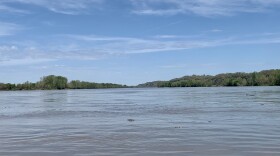-
Cities are grappling with how to proceed concerning the increase in data centers in Missouri. New legislation would require water permits for large-load consumers, and make them pay for grid infrastructure upgrades needed to provide them electricity.
-
KC Water will use nearly $2 million in new state funding to search for lead pipes in historically disadvantaged neighborhoods, starting this spring in Lykins and Columbus Park.
-
Environmental advocates say the outlined revision ignores science and threatens water quality, while farm groups argue it offers landowners needed clarity about which parts of their land count as federally protected.
-
Groundwater in western Kansas is a precious commodity. Hays and Russell are back in court to defend a plan to transfer water from a ranch in another county.
-
A volunteer-led Stream Team is using kits to test their local waterways quarterly for phosphorus, ammonia and nitrogen, and survey for small aquatic species, such as clams, snails and insect larvae. Otherwise, funding cuts means that nobody is looking out for Missouri's water health.
-
Next year, Kansas City’s only drinking water treatment plant will celebrate its 100th birthday. It’s a milestone worth applauding, for sure, but it’s also a reminder that the city has only one place where it makes clean water.
-
For nearly a century, the city’s drinking water purification process has taken place with few major hiccups at a lone Briarcliff facility. But KC Water leaders say maintenance costs are climbing and aging concrete is a concern. They’re urging support for a new treatment plant in Kansas City.
-
The program provides a long-term look at water quality in some of Missouri's most famous lakes. It will end in 2027 after a state agency will no longer provide federal funding.
-
State officials say Missouri's current standards, last revised a quarter century ago, are based on outdated science. For small rural communities, it could require major upgrades for water treatment facilities.
-
In dry years, Tuttle Creek Lake and other reservoirs keep the Kansas River flowing strong enough to provide drinking water for hundreds of thousands of people. But these manmade lakes are disappearing.
-
Settlement payments from chemical companies are helping cities pay for expensive PFAS removal technology. But local leaders say the dollars often fall short of covering the full costs to clean up drinking water.
-
A proposed data center caused a public outcry in recent weeks in St. Charles, Missouri, with residents criticizing the secrecy around the project and its potential to contaminate water.
Play Live Radio
Next Up:
0:00
0:00
Available On Air Stations












